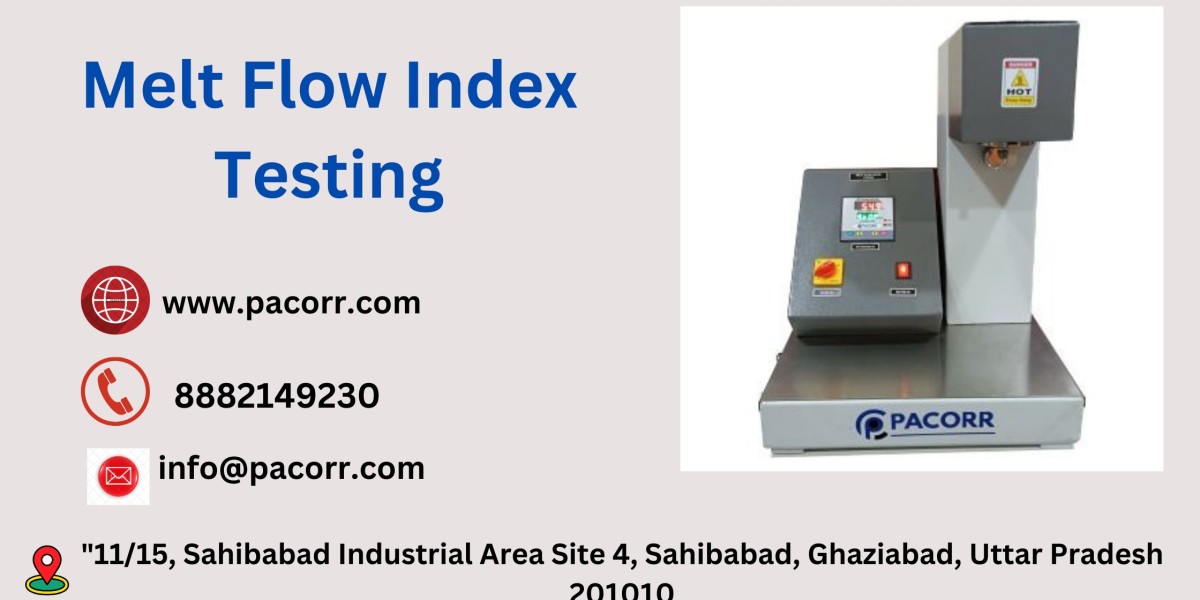Melt Flow Index Tester: An Essential Tool for Polymer Quality Analysis
In today's competitive market, ensuring the quality of raw materials and finished products is crucial for manufacturers in the polymer industry. One of the most reliable ways to measure the quality and consistency of polymers is through the Melt Flow Index Tester (MFI). Pacorr offers high-precision Melt Flow Index Testers designed to help industries determine the flow characteristics of polymers under specified conditions. This article dives deep into the functionality, importance, and applications of the Melt Flow Index Tester and why it is essential for maintaining the highest standards in polymer manufacturing.
What is a Melt Flow Index Tester?
The Melt Flow Index Teste measures the rate of extrusion of molten polymers through a die under specific temperature and load conditions. This test evaluates the flow properties of thermoplastic materials by determining how much polymer passes through the testing die within a given time. The measured value, expressed in grams per 10 minutes, is called the Melt Flow Rate (MFR) or Melt Flow Index (MFI).
The Melt Flow Index Test is crucial in assessing the processability of polymers during manufacturing processes like injection molding, extrusion, and blow molding. It provides manufacturers with an essential understanding of how polymers behave under high-temperature conditions, which is vital for producing consistent, high-quality products.
Working Principle of a Melt Flow Index Tester
The operation of the Melt Flow Index Tester follows a straightforward process:
- Preheating: The polymer sample is placed inside a preheated barrel, which is set at a specific temperature depending on the polymer type.
- Application of Load: A known weight (load) is applied to the sample to initiate the flow of the molten polymer.
- Extrusion: The polymer is forced through a die of a known diameter under the influence of the applied weight.
- Measurement: The amount of polymer extruded in a 10-minute interval is collected and weighed to determine the Melt Flow Index.
Importance of Melt Flow Index Testing
The Melt Flow Index (MFI) test is critical for several reasons, including:
- Quality Control: By measuring the MFI, manufacturers can ensure that the polymer's viscosity remains consistent across different batches. Variations in MFI can indicate impurities or inconsistent material properties.
- Processability: MFI helps predict how a polymer will behave during processing methods such as injection molding, extrusion, and thermoforming. Materials with higher MFI tend to flow more easily, which can be advantageous in certain processes but may result in lower mechanical strength.
- Material Selection: Engineers and manufacturers use the MFI values to select materials that best suit their production requirements. For instance, a low MFI polymer may be ideal for applications requiring high strength and stiffness, while a high MFI polymer is preferred for applications demanding greater flexibility and ease of molding.
- Cost Efficiency: Identifying the correct MFI for a polymer reduces wastage during processing and ensures efficient production cycles, saving time and costs.
Features of Pacorr's Melt Flow Index Tester
Pacorr's Melt Flow Index Tester Price stands out due to its precision and ease of use. Some of the key features include:
- Digital Display: The tester is equipped with a digital display that shows accurate real-time data, ensuring precise measurements of the melt flow index.
- Automated Operation: The system is semi-automated, requiring minimal operator intervention. This reduces the chance of human error and improves testing accuracy.
- User-Friendly Interface: The intuitive design and control panel allow for easy operation, making it suitable for both seasoned professionals and new operators.
- Temperature Control: The preheated barrel maintains a consistent and accurate temperature, ensuring reliable test results regardless of the polymer material.
- Multiple Load Options: The tester is capable of applying different loads to meet the testing requirements of various polymers.
Applications of Melt Flow Index Testing
The Melt Flow Index Testing finds application in various industries, especially those working with thermoplastic polymers. Here are some common areas where MFI testing is utilized:
- Plastics Manufacturing: Whether it’s for packaging, automotive components, or household items, plastic manufacturers use MFI testing to ensure that their materials meet processing and performance specifications.
- Polymer Research and Development: R&D laboratories use MFI data to develop new polymer formulations and optimize production processes.
- Quality Control Laboratories: Routine MFI testing helps quality control teams ensure that every batch of material adheres to set standards and specifications.
- Recycling Industry: The recycled polymer industry uses MFI testing to verify that reclaimed materials meet the required flow properties for new applications.
Why Choose Pacorr's Melt Flow Index Tester?
Pacorr is a leading name in the field of testing instruments, with a strong reputation for delivering reliable and accurate testing equipment. When you choose Pacorr’s Melt Flow Index Tester, you benefit from:
- High Precision: Pacorr’s instruments are designed to deliver accurate, repeatable results, ensuring that your materials meet the necessary quality benchmarks.
- Durability: The Melt Flow Index Tester is built to withstand rigorous industrial use, with high-quality materials ensuring long-term reliability and minimal maintenance.
- Compliance with Standards: Pacorr’s Melt Flow Index Tester complies with several international standards, including ASTM D1238 and ISO 1133, making it a trusted choice for global manufacturers.
- Versatility: The tester is compatible with a wide range of polymers, making it a versatile tool for different industries.
- Customer Support: Pacorr offers exceptional customer support, with a team of experienced professionals ready to assist with installation, operation, and maintenance of the equipment.
Conclusion
The Melt Flow Index Tester is an indispensable tool in the polymer industry for evaluating the flow properties of thermoplastic materials. Whether for quality control, research, or manufacturing, Pacorr’s Melt Flow Index Tester provides accurate, reliable data that helps ensure the consistency and quality of polymer products.








